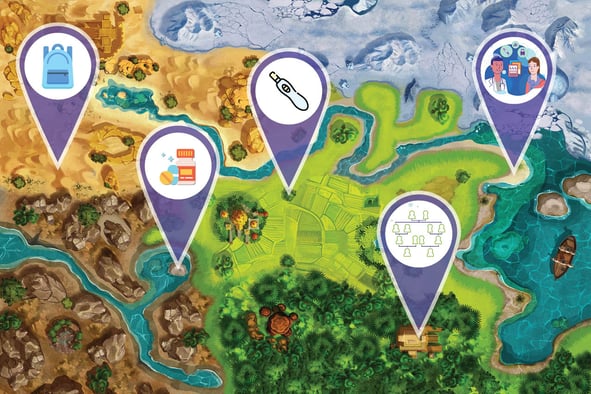
Whether you’re currently pregnant or thinking of becoming so in the future, you might be wondering how best to proceed. While I was never a Boy Scout, I can totally get behind their motto to “Be Prepared”, especially when it comes to pregnancy.
No doubt, pregnancy tests and prenatal vitamins are among the earliest supplies one should have stashed away in their Pregnancy Backpack, but they are far from the only ones and, in my humble opinion, certainly not the most important.
Like any good scout, I think a map that provides a bird’s eye view of your pregnancy journey is a good place to start.

In each pregnancy, there is a 3%-4% chance of a genetic condition, chromosome condition, birth defect or intellectual disability, many of which are not detectable through prenatal diagnostic or screening techniques.
Before you begin your journey, or get too far down the path, knowing whether or not there is something in your personal or family health history that increases this risk can be useful. Examples of scenarios that could increase this risk include:
- Advanced maternal or paternal age
- A history of multiple miscarriages
- A personal or family history of a birth defect, genetic condition or chromosome issue
- Exposure to a substance, such as a medication, infection or radiation, that may be harmful to the baby
Continue reading to find out how each can affect your current or future offspring. Or visit our Pregnancy Genetic Testing page to learn more about your genetic testing options.
Advanced Parental Age
Advanced maternal age (AMA) is defined as a woman being 35 or older at the time of delivery. While most women who are AMA have healthy children, increased age is associated with an increased risk of chromosome conditions, specifically aneuploidy (the risk that a baby will have an extra chromosome). This in turn results in birth defects and intellectual issues. Learn more about genetic testing for pregnancy over 35.
Advanced paternal age (APA) is less firmly defined. Although there is no consensus, most studies have suggested this refers to any man who is age 40–50 years (or older) at the time of conception. Changes in specific genes such as FGFR2, FGFR3, RET, MEN2A and MEN2B, which are associated with conditions including (but not limited to) Pfeiffer syndrome, Crouzon syndrome, Apert syndrome, achondroplasia, thanatophoric dysplasia and multiple endocrine neoplasia are most strongly associated with APA as is an increased risk for complex disorders such as some congenital anomalies, schizophrenia, autism spectrum disorders, and some forms of cancer.
Multiple Miscarriages
Studies have revealed that anywhere from 10-25% of all clinically recognized pregnancies end in miscarriage. There are various causes of miscarriage, including maternal infection, maternal conditions, hormonal imbalance and structural uterine abnormalities.
Recurrent pregnancy loss (RPL), defined as two or more losses, affects between 1% and 5% percent of couples. Approximately 50% of women experiencing RPL will have an identifiable etiology.
In approximately 4% of couples who have had two or more unexplained pregnancy losses, a balanced chromosomal rearrangement is identified in one of the partners. Identifying balanced translocation carriers is valuable because in addition to miscarriage, these individuals may be at an increased risk to have a live born infant with an unbalanced chromosomal condition that could result in intellectual or physical disabilities.
A Significant Personal or Family Health History
When there is a personal or family history of a health issue, the risk for occurrence in other family members can be increased. Knowing more about your family health history can empower you to make informed decisions about your future pregnancy, by understanding how it impacts risks to your baby, and it can also allow you to take better control of your own health.
In talking with your family, commonly asked issues to ask about can include a history of:
- intellectual disabilities, developmental delay or autism spectrum disorder
- early onset blindness or deafness
- neurological, muscular or skeletal disorders
- birth defects (like a cleft lip), genetic conditions (like cystic fibrosis) or chromosome conditions (like Down syndrome)
- infant deaths, infertility or recurrent pregnancy loss
- consanguinity (you or your partner are related by blood)
- sudden death or cardiac disease diagnosed under the age of 50
- cancer diagnosed under the age of 50
Typically, it is helpful to know not only if the pregnant woman and father of the pregnancy are affected, but also if their other children, siblings, siblings’ children, parents and aunts/uncles are affected.
Exposures
Certain exposures, including environmental impacts and/or specific medications during pregnancy, have the potential to cause a detrimental impact on fetal development while others medications are recommended to continue throughout pregnancy.
Factors to consider regarding exposures include:
- What is the medication or exposure?
- When during the pregnancy was the exposure?
- What was the dose of the medication?
- Why was the medication taken ?
It is best for a woman to review current medications with her prescribing health care provider before becoming pregnant or as soon as she becomes aware that she is pregnant. In addition, it is recommended that she consult with a health care provider before making any changes to how current medications are taken.*
If you’ve ever taken a vacation to an unfamiliar area, it’s one thing to have a map; it’s an entirely different experience when you have a personal guide. Think of a prenatal genetic counselor as your personal guide.
A prenatal genetic counselor is a healthcare professional trained to help expecting parents understand: (1) their risk of having a baby with certain birth defects, genetic conditions or chromosome conditions, and (2) how factors such as parental age, family history and lifestyle may impact the health of a baby. Bonus: they explain it in ways that you can understand.
You and your reproductive partner may not have any of these risk factors:
- advanced parental age
- a history of multiple miscarriages
- a personal or family history of a birth defect, genetic condition or chromosome issue or
- exposure to any medications, infections or radiation
Nevertheless, prenatal genetic counseling can still act as a guide to explain the availability, benefits and limitations of the many prenatal genetic screening and diagnostic testing options that may be offered to you. Whether it’s carrier screening, first trimester screening, non-invasive prenatal testing, chorionic villi sampling or amniocentesis, they can help you “Be Prepared.”
Having a baby can be exciting and overwhelming and terrifying, all at the same time. The prenatal genetic counselors at Genome Medical are here to guide you through this exhilarating journey so you end up exactly where you decide you need to be.
Resources & Notes:
- https://s3.amazonaws.com/cdn.smfm.org/publications/223/download-f5260f3bc6686c15e4780f8100c74448.pdf
- https://www.acmg.net/PDFLibrary/Advanced-Paternal-Age-Genetic-Counseling.pdf
- https://americanpregnancy.org/healthy-pregnancy/pregnancy-complications/signs-of-miscarriage-916/
- https://uscfertility.org/usc-center-pregnancy-loss/recurrent-loss/
- https://www.ncbi.nlm.nih.gov/pmc/articles/PMC6333030/
- https://www.marchofdimes.org/pregnancy/prescription-medicine-during-pregnancy.aspx
Images: https://www.freepik.com
* This blog constitutes general information about genetic testing and medical screening. This blog does not offer or provide medical advice or diagnosis, and nothing in this webinar should be construed as medical advice or diagnosis. Do not rely on the information in this webinar to make medical management decisions. Please consult with a medical professional before making those decisions. Do not delay in seeking professional medical advice if you think you have a medical concern. Do not disregard professional medical advice based on any information received in this blog.

